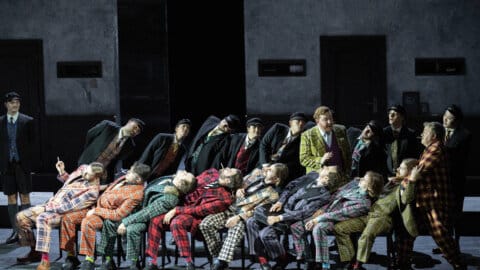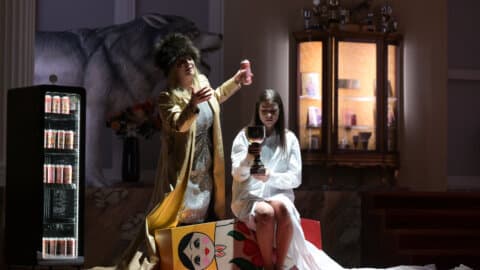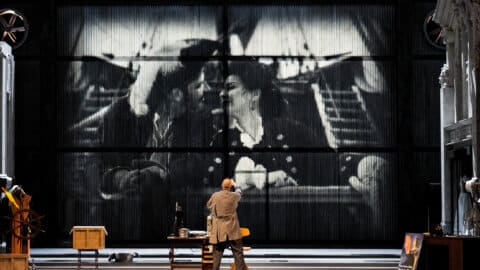HERCULES • OPER FRANKFURT
★★★☆☆☆
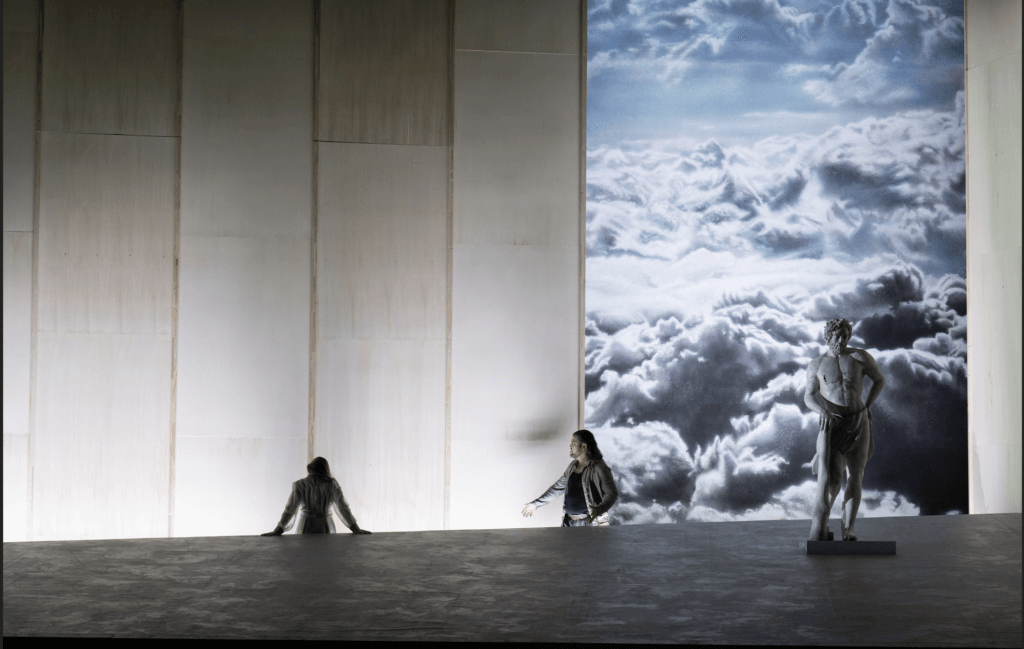
Photo: Monika Rittershaus
REVIEW HERCULES DISAPPOINTS IN FRANKFURT
Star director Barrrie Kosky disappoints expectations with a tame Frankfurt production of Hercules, where a semi-concertante, under-dramatized opera/oratorio hybrid, despite strong soloists, an excellent opera chorus and sublime orchestral playing conducted by Laurence Cummings, leaves a feeling of having sat between two chairs.
The production opens promisingly with a tight, graphic composition in which a white marble statue of the title character is placed on a purple sofa in the otherwise naked stage space. Here, however, it remains for the next two hours.
Around it, the show’s characters gradually flock, led by Hercules’ wife Dejanira and the captive Princess Lole, as the trigger for the neurotic jealousy that eventually sets the ancient drama ablaze.
An exceptionally strong Frankfurt Opera Chorus in forced mass choreography enhances the musical experience, but fails to make up for this staging’s lack of conceptual, dramaturgical idea and creative tension.
Paula Murrihy (Dejanira) and Elena Villalón (Iole) impress vocally and dramatically. Anthony Robin Schneider is also strong as the flesh-and-blood Hercules who finally makes an appearance.
Hercules is an opera outside the category – in fact, it is not an opera at all. Handel wrote it as an oratorio a la Messiah, at a time when his operas were losing popularity and Handel needed to stabilize his finances.
The first performance in 1745 was something of a flop, but connoisseurs have since given it credit for its innovative approaches and moving soundscapes.
How Barrie Kosky, known for his show-stopping mega-performances, came to create this minimalist production is a mystery.
Perhaps it’s a divergent stylistic exercise by the master as he prepares his eagerly awaited version of The Rhinegold, which will premiere at the Royal Opera House in London on September 11.
Hercules is about jealousy, that kills. Hercules’ wife is convinced that he has stopped loving her. The truth is that he has never loved her more and his wife’s idea to the contrary is a fatamorgana.
In an attempt to regain her ‘lost’ love, she gives Hercules an enchanted love cloak, but it turns out to be cursed and has a regrettable malfunction.
The cloak catches fire and Hercules staggers onto the stage, disfigured by nasty burns, and drops dead.
No rest finds the guilty, sings the now desperate Dejanira in one of the last arias, where the fabulous chorus closes the ballet from the side aisles in the stalls.
It doesn’t get really gripping, despite the fact that the performance comes together after the interval, when the seated Hercules statue has jumped out of the sofa and been replaced by an upright one.
At the same time, a few of the wall panels have been removed to reveal blue skies and white clouds of lambs. Enjoy the view from Olympus.
The highlight is a fabulous performance from Irish mezzo Paula Murrihy in her bitter-ironic flirtation with Hercules, who asks for little respect for his allegiance and victorious exploits on the battlefield.
Instead, he is met with scornful, infantile resentment from his wife, who has gone off the deep end. The psychological break is sensitively, vocally interpreted with fine technique and powerful coloratura.
The well accustomed Frankfurt audience acknowledges with generous applause at curtain call. And the booing that I have gradually prepared myself for when Kosky himself comes on stage for the recitals is completely absent.
Perhaps it’s just me who hasn’t realistically adjusted my expectations for this oratorio-opera and the genre’s scenic potential.
That the Hercules statue begins to smoke like smoke from a fire – a kind of echo of the tragedy – is a visual bonus during the finale’s beautiful choral piece. Elegant, but it didn’t quite knock me off my feet.
Three stars from Got To See This. You can’t win them all.
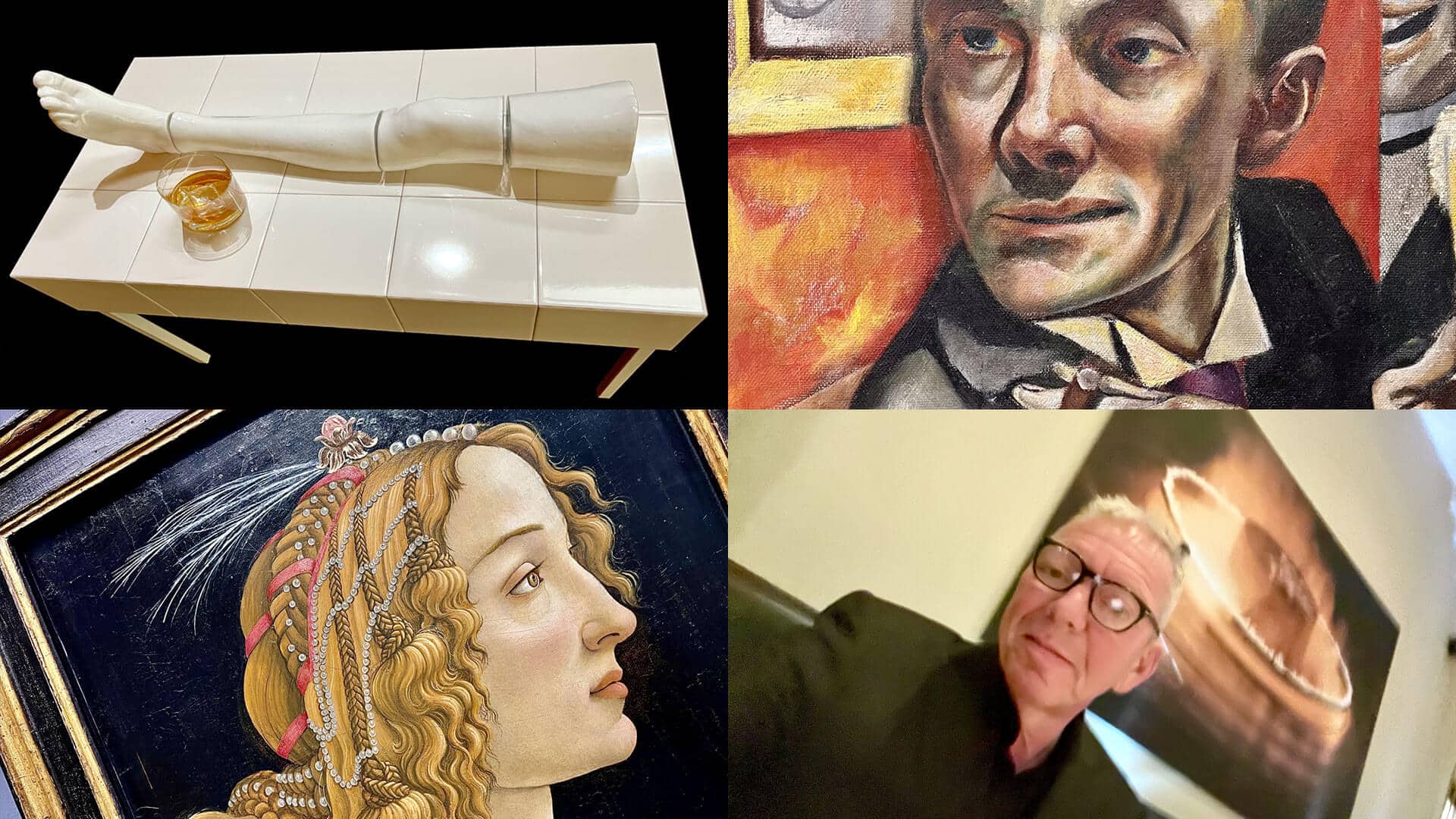
QUICK FRANKFURT TIPS
Rent a Nextbike bike via mobile (they’re everywhere in the city center) and pedal along the banks of the Main River, where fat geese frolic in the pretty green spaces overlooking runners, kayakers and Frankfurt’s iconic skyline.
Museums and galleries are close by and I recommend the Städel with old masters (including a gorgeous Botticelli painting), as well as a fine collection of Weimar artists with their colorful motifs and brash style.
Just off Römer Square you’ll find both the Museum of Modern Art and the Schirn Kunsthalle, with well-stocked collections of installation works that are only partially understood, unless you’d much rather take a seat at the square’s numerous watering holes and enjoy ice-cold, frothy quality beer.
I like to stay at the excellent, affordable Motel One Römer 200 meters from the old, rebuilt city center – and even shorter to Oper Frankfurt at Willy Brandt Platz.
After a performance at the opera, you eat at Fundus, where I have several times seen the stars of the evening arrive for dinner to great applause from the guests.
Baja Bike has excellent, guided bike tours that give a good overview of the city, which is smaller than you think and in many ways worth a weekend trip.
The Alte Oper, by the way, has been beautifully rebuilt and plays high-quality classical concerts interspersed with various popular shows and rock concerts.
Local football heroes Eintracht Frankfurt beat Suttgart in the semi-final shortly after my visit, will play the German Cup final against Leipzig on June 3. Good luck to them.

